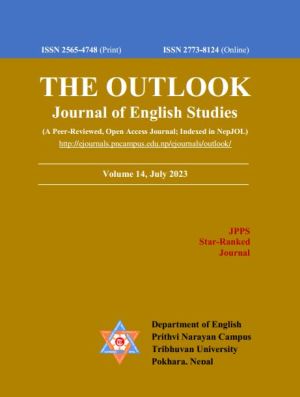Critiquing Hegemony and Fostering Self-Agency in BP Koirala’s Atmabrittanta
DOI:
https://doi.org/10.3126/ojes.v14i1.56653Keywords:
Hegemony, resistance, agency, autobiographyAbstract
Atmabrittanta, an autobiography of Bishweshwar Prasad Koirala (popularly known as BP Koirala), was originally narrated onto a microphone in 1981-82. Moreover, it was published in Nepali in 1998 and the further translated English version was printed in 2001. It mainly incorporates the Nepali tales of revolutionary activism for democracy and nationhood. In the international context, it largely deals with colonial and postcolonial India and her political relationship with Nepal. Likewise, the political association with China is also the content of the book. In these backgrounds, the study analyses the autobiography for exploring how resistance blends with agency and how such oppositional activism contends with national and international hegemonic power blocs, especially applying Antonio Gramsci’s concept of hegemony, Jocelyn A. Hollander and Rachel L. Einwohner’s notion of resistance and Kaspar Maase’s idea of agency. Using textual analysis as a research method, this qualitative study uncovers the domination of neighboring countries, the anarchism of Rana dictators, the supremacy of the absolute kings and the regulations of male chauvinism as internal hegemonic tools to organize people’s consent. In addition, the analysis finds the autobiography as a manual for resisting such hegemonic forces to empower people and the sovereignty of Nepal primarily in the form of self-agency. The empowerment and development of self-agency in the national and international contexts ultimately contribute to democracy and nationalism.
Downloads
Downloads
Published
How to Cite
Issue
Section
License

This work is licensed under a Creative Commons Attribution-NonCommercial 4.0 International License.
This license enables reusers to distribute, remix, adapt, and build upon the material in any medium or format for noncommercial purposes only, and only so long as attribution is given to the creator.

